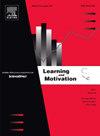对多语种留学生在英语作为外语环境中进行自我调节学习的复杂因素进行混合方法调查:社会认知视角
IF 1.7
4区 心理学
Q3 PSYCHOLOGY, BIOLOGICAL
引用次数: 0
摘要
自我调节学习是理解学习的认知、动机和情感层面的基本框架。最近,越来越多的关于认知过程的研究出现在多语言人群中。本研究采用混合方法,考察了中国 233 名多语言留学生自我调节学习过程的关键要素,特别是在英语作为外语学习的背景下。通过皮尔逊相关分析、结构方程模型和路径分析对定性数据进行了分析,同时进行了半结构式访谈,以进一步确认定性数据分析的结果。通过有目的的抽样,我们有针对性地选择了 15 名学生参与后续访谈。在社会认知理论的框架下,研究结果表明,元认知、动机、自我效能感和反馈回路是自我调节学习的主要组成部分。此外,路径分析证实,这四个因素对中国多语种留学生的自我调节学习能力具有积极的预测作用。访谈结果进一步验证了这些主要因素在多语种学习背景下的自我调节学习过程中不可或缺的作用。本研究强调了将翻译语言背景纳入教学策略和语言政策的重要性。研究结果可为多语种留学生、语言教师和汉语教学领域的语言政策制定者提供一些启示。本文章由计算机程序翻译,如有差异,请以英文原文为准。
A mixed-methods investigation into complex components of multilingual international students' self-regulated learning in English as a foreign language context: A social cognitive perspective
Self-regulated learning serves as a fundamental framework for understanding the cognitive, motivational, and emotional dimensions of learning. Recently, a growing body of studies on such cognitive processes appears in multilingual populations. Applying a mixed-methods approach, this study examined the key components of the self-regulated learning process among 233 multilingual international students in China, specifically within the context of English as a Foreign Language learning. Qualitative data was analyzed through Pearson's correlation analysis, structural equation modeling, and path analysis, while semi-structured interviews were conducted to further confirm the results of the qualitative data analysis. 15 students were purposefully selected through purposive sampling to participate in follow-up interviews. Within the framework of social cognitive theory, the findings revealed that metacognition, motivation, self-efficacy, and feedback loops are the primary components of self-regulated learning. Additionally, path analysis confirmed that the four factors are positive predictors of self-regulated learning proficiency of multilingual international students in China. The interview outcomes further validated the integral role of these primary components in the self-regulated learning process within the context of multilingual study. This study underscores the significance of incorporating translanguaging backgrounds into teaching strategies and language policy. Findings may offer some insights for multilingual international students, language teachers, and language policymakers in the field of Chinese language instruction.
求助全文
通过发布文献求助,成功后即可免费获取论文全文。
去求助
来源期刊

Learning and Motivation
Multiple-
CiteScore
2.90
自引率
0.00%
发文量
53
期刊介绍:
Learning and Motivation features original experimental research devoted to the analysis of basic phenomena and mechanisms of learning, memory, and motivation. These studies, involving either animal or human subjects, examine behavioral, biological, and evolutionary influences on the learning and motivation processes, and often report on an integrated series of experiments that advance knowledge in this field. Theoretical papers and shorter reports are also considered.
 求助内容:
求助内容: 应助结果提醒方式:
应助结果提醒方式:


